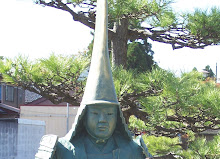 After 150 years, is Japan closed for a second time? The fundamental tension in Japanese culture has always been between isolation on one hand and an undiscriminating love of all things foreign on the other.
After 150 years, is Japan closed for a second time? The fundamental tension in Japanese culture has always been between isolation on one hand and an undiscriminating love of all things foreign on the other.(Photo courtesy of Toby Forage)
According to writer Gavin Blair, isolationism and an inward, domestic focus is now winning out in Japan. He writes about a new Japanese isolation in an article titled “More Japanese Shunning the Outside World” in Japan Today.
He begins:
“Today, it appears that Japan is increasingly looking inward and walling itself off from outside influences — a trend that’s showing up in everything from movies to music to learning languages.”
Okay, let’s see how he proves this thesis:
“‘When I was a university student, courses like English literature, German literature, French literature and foreign languages were difficult to get into, they were so popular,’ said Takashi Koyama, a professor at Akita International University. ‘Nowadays, those courses are struggling to get students.’”
Interesting. I know a Japanese woman in her 40s; she is quite literary and artistic. She knows the great books of western literature and, of course, plays the violin and loves western classic music. I wonder if she is a dying breed…It makes me think of Japanese novelist Haruki Murakami, who has been largely influenced by American writers, but of course was born in 1949 to a very different generation.
Mr. Gavin then reminds the reader that it was only 150 years ago that Japan opened its borders to the outside world after being literally closed for 300 years. And then, of course, by the 1930s the problem with Japan was that it was all too interested in foreign countries, more specifically in invading them, and making them puppet states.
Gavin then focuses on the recent Oscar victory of “Okuribito” (Departures) in the foreign language film and what this might tell us. He mentions that Japanese films are doing better domestically, while Hollywood films are declining in popularity. He quotes a film distributor:
“‘Younger Japanese audiences don’t connect so strongly with Hollywood films recently,’ said Yusuke Horiuchi of Toho-Towa, which distributes overseas films in Japan.”
I’m not sure that proves much. I’m a 30-something American guy and I don’t connect with Hollywood films either. Maybe the Japanese can detect fluff and stupidity when the see it.
The writer then contrasts the strength of Japanese films, with the sad state of J-Pop, while still noting that Japanese pop music is outselling international pop music…That’s interesting, but not terribly shocking news.
He then jumps into some weightier matters regarding Japan cultural issues:
“The causes of this increase in parochialism are somewhat hard to identify. A sense of cultural pride, particularly among young people, has certainly developed regarding the popularity of Japanese manga, music and fashion.”
Okay, but can we logically conclude that “cultural pride” is what has lead to this inward, navel gazing now underway in Japanese culture? The French people, for example, are quite proud of French culture, but they are not easily described as parochial.
Continuing on:
“The 'hungry spirit' that drove Japan’s development from post-war decimation to economic superpower, has inevitably faded, and with it, the notion that interaction with the outside world is a necessity rather than a wish.”
The first part of this idea is spot on. Rebuilding Japan after World War II gave the Japanese people a real purpose for sure; and we should marvel at what Japan was able to achieve by the ‘60s and ‘70s. But I’d argue that this in and of itself, was all about Japan and not about being some engaged global citizen. I’m not sure that we can describe exporting Toyotas as a dramatic “interaction” with the outside word. It’s trade. The U.S. trades with China, but it’s hard to argue that China is having a great cultural influence on the U.S.
I think the next sentence is where Mr. Gavin is actually going with this:
“But whatever its roots, some are worried a rise in nationalist sentiment is mirroring this loss of interest in foreign languages and foreign affairs.”
And then he ends with…“Some observers in Japan however, no longer see creeping isolationism in a globalized 21st century as a laughing matter.”
Among many politicians in Japan, as well as foreigners with a progressive bent in Japan, there is the fear that any hint of Japanese cultural pride is a prelude to nationalism. This is irrational. There is a big difference between nationalism and Japanese patriotism, which must be fostered in young people.
Young Japanese people are taught to be weary of flags and national anthems and there is no way to justify this in the year 2009. A healthy Japanese national identity will not develop unless Japanese young people are first taught the truth about Japanese aggression in WW II, but then Japanese society was seriously reformed after the war. You don't think so? Look at the Emperor today - instead of being a god - he is treated more like the assistant deputy of agriculture, a nobody really.
I think the real danger for Japan, is not that it will once more become a global military bully (for it does not have the human capital or the natural resources to do so), but that it becomes a country forgotten by the 21st century economy, or perhaps even a victim of Chinese or Russian aggression.
Anyone who loves Japanese culture wants to see Japan have a role in Asian geo-politics, global economics and the cultural give-and-take of the great nations, but it seems instead that Japan is setting itself up for a slow, cranky retirement from the first order of nations.








No comments:
Post a Comment